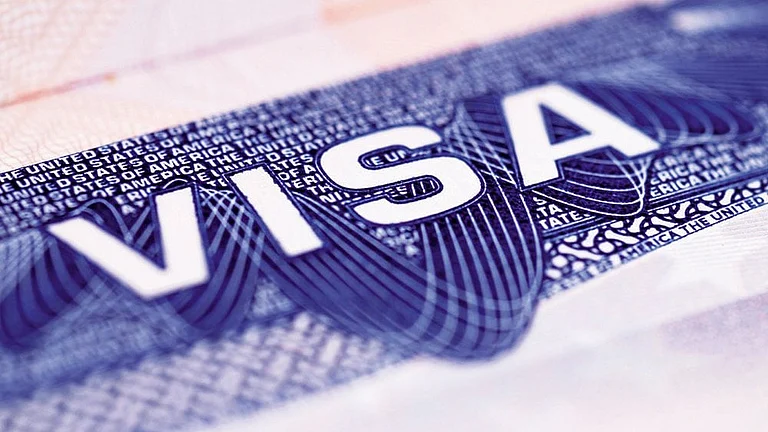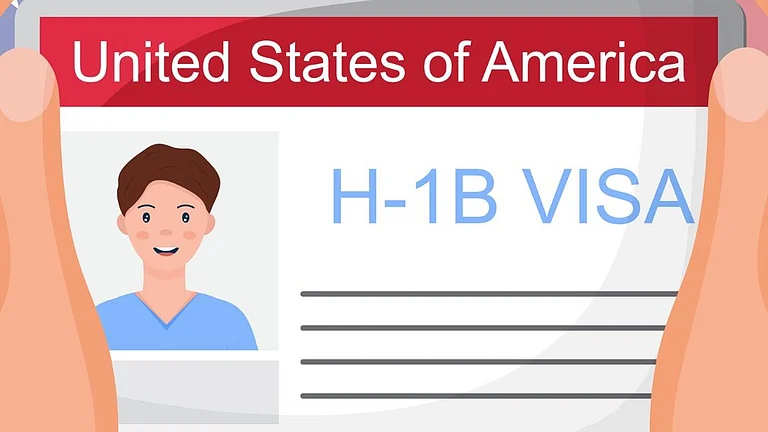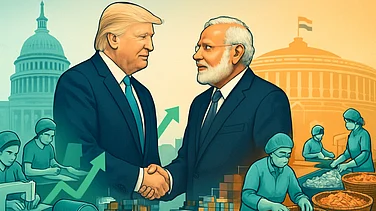
Trump’s new executive order raises the annual H-1B visa fee to $100,000 per worker, effective September 21.
Experts say the move could severely disrupt Indian IT firms that rely on H-1B visas, though many have already reduced their dependence.
Workers outside the US will be directly affected, while those inside remain unaffected until renewal.
NASSCOM warned the change could hurt Indian professionals, disrupt onshore projects, and affect the wider US job market.
US President Donald Trump’s new executive order to increase fees for H-1B visas, widely used to hire highly skilled foreign workers, could further disrupt the business of Indian IT giants. Many of these firms have already been reducing reliance on the programme.
The order, signed on Friday, requires companies to pay $100,000 annually for every foreign worker hired under the H-1B visa—up from about $1,000 at present, a rise of more than 9,000%. It takes effect on September 21.
From Sunday, prospective or travelling H-1B workers outside the US will be directly affected, as visas will be denied unless the new $100,000 fee is paid. Reports suggest companies like Microsoft and JP Morgan have issued urgent advisories to employees on H-1B and H-4 visas, asking them to return to the US before the rule kicks in.
Those already inside the US remain unaffected until their visa renewals. According to the White House, the new rules will automatically expire after 12 months unless extended following agency reviews post-lottery. For now, exemptions have been provided for healthcare workers in shortage areas, critical infrastructure/defence roles, and certain research or academic fields. Section 1(c) of the order also allows the Secretary of Homeland Security to grant waivers if hiring such workers is deemed in the national interest.
Industry body NASSCOM said the move will hit Indian nationals working for both global and Indian companies in the US.
“India’s technology services companies will be impacted as business continuity will be disrupted for onshore projects, which may require adjustments. Companies will work closely with clients to adapt and manage transitions,” it said, adding that such sudden changes can have ripple effects on America’s innovation ecosystem and job market.
What It Means for Indian IT Firms
Indian IT companies are among the largest users of H-1B visas. The White House order appears targeted at them, noting:
“IT firms in particular have prominently manipulated the H-1B system, significantly harming American workers in computer-related fields.”
The share of IT workers in the H-1B programme grew from 32% in FY2003 to an average of over 65% in the last five years. The order highlights that outsourcing firms benefit from lower costs, with studies showing tech workers on H-1B “entry-level” positions are paid about 36% less than their US counterparts.
However, reliance has been falling. According to the National Foundation for American Policy (NFAP), approved H-1B petitions for initial employment from the top seven Indian IT firms dropped 56%, from 15,100 in FY2015 to just 6,700 in FY2023. One large Indian IT services company, once the biggest H-1B sponsor, recorded a 75% decline over this period.
In 2025 so far, according to USCIS data, Tata Consultancy Services (TCS) sponsored 5,364 H-1B visas, followed by Cognizant (2,493), Infosys (2,004), LTI Mindtree (1,807), and HCLTech (1,728). Together, these firms accounted for 13,396 sponsorships.
Indian IT companies have already been adapting. Tech Mahindra COO Atul Soneja told Outlook Business that margin expansion in recent quarters was “supported by higher offshoring, improved execution in fixed-price contracts, and productivity enhancements.” CEO Mohit Joshi added that reliance on H-1B is now below 30%, with “large local teams and near-shore delivery centres” in place.
TCS, which earns nearly half its revenue from North America, now hires more than 50% of its US workforce locally, CEO K. Krithivasan said earlier this year. Infosys has over 60% of its US staff hired locally, while HCLTech and Wipro rely even less on H-1Bs, capping usage at about 500–1,000 annually.
“Over the past several years, Indian IT firms have significantly reduced reliance on the H-1B visa, with filings dropping by over 50%. This shift is a result of our strategy to hire locally, invest in automation, and strengthen global delivery models. While visa fees may change, the business impact will be minimal,” said C.P. Gurnani, Co-founder and CEO of AIonOS.
NASSCOM also acknowledged this decline, noting that “India-centric companies have steadily reduced reliance on these visas through increased local hiring in recent years.”
From 80–20 to 90–10
According to Pareek Jain of EIIRTrend, in most IT projects today, about 20% of employees work onsite (onshore) while 80% are offshore in locations like India.
“The onsite staff is critical for client interaction and managing challenges. Traditionally, this 20% was filled through local hires, subcontractors, and Indian students on H-1B visas. But since even subcontracting relies on H-1Bs, this isn’t sustainable,” Jain said.
He added that being forced to hire more US citizens or green card holders will significantly raise costs, hurting margins and creating disruptions in ongoing projects. “Many second-generation Indian students will enter the workforce, but the pool still does not fully meet specialised IT needs,” he said.
In the short term, companies may manage with local hiring, but at a higher cost. According to Teamlease Digital CEO Neeti Sharma, “Companies will become very selective in sponsorships, assessing ROI carefully. Lower H-1B usage means lower onsite staff, but over time it could mean more offshore roles and possibly more US firms setting up entities in India.”
Jain further noted that in the medium to long term, the new visa fee could actually accelerate outsourcing.
“Clients under cost pressures may expand offshoring or build Global Capability Centres (GCCs) in India. The 80–20 model may shift closer to 90–10. However, future legislation like the HIRE Act or other immigration reforms could again change the dynamics,” he said.


































